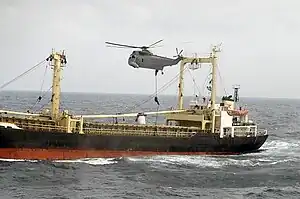Spanish frigate Navarra
Navarra (F85) is the fifth of the six Spanish-built Santa Maria-class frigates, based on the American Oliver Hazard Perry-class design, of the Spanish Navy.
_during_Standing_Naval_Force_Atlantic_exercise_with_USS_Trenton_(LPD-14)%252C_USS_Saipan_(LHA-2)%252C_and_USS_Simpson_(FFG-56)_in_background_040925-N-8327M-001.jpg.webp) Navarra on 25 September 2004 | |
| History | |
|---|---|
| Name | Navarra |
| Namesake | Navarra |
| Builder | Bazan |
| Laid down | 15 April 1991 |
| Launched | 23 October 1992 |
| Commissioned | 27 May 1994 |
| Homeport | Rota |
| Identification | |
| Status | in active service |
| General characteristics | |
| Class and type | Santa Maria-class frigate |
| Displacement |
|
| Length | 138.8 m (455 ft 5 in) |
| Beam | 14.3 m (46 ft 11 in) |
| Draft | 8.6 m (28 ft 3 in) |
| Propulsion | 2 × General Electric LM2500-30 gas turbines generating 41,000 shp (31 MW) coupled to a single shaft and controllable-pitch propeller |
| Speed | 30 knots (56 km/h; 35 mph)+ |
| Armament |
|
| Aircraft carried | SH-60 Seahawk LAMPS III helicopter |
Construction and career
Laid down on 15 April 1991, and launched on 23 October 1992, Navarra was commissioned in service on 27 May 1994.
The ship features a series of improvements to her previous sisters, with a new Meroka mod 2B CIWS, and upgraded fire control systems with Mk.92 mod6 CORT (Coherent Receiver Transmitter) and SPS-49(v)5 radar instead of previous (v)4.
All of these Spanish frigates have the length of the later Oliver Hazard Perry frigates, and have a wider beam than the US Navy design, and therefore able to carry more top weight. Fin stabilizers are fitted.

On 9 December 2002, Navarra intercepted the unflagged freighter So San several hundred miles southeast of Yemen at the request of the United States government, possibly associated in some fashion with the U.S. Proliferation Security Initiative. The frigate fired across So San's bow after the freighter ignored hails and attempted to evade the frigate. The freighter's crew was North Korean; 23 containers containing 15 complete Scud ballistic missiles, 15 high-explosive warheads, and 23 nitric acid containers were found on board. Yemen claimed ownership of the shipment and protested the interception and U.S. officials released the vessel after receiving assurances that the missiles would not be transferred to a third party.[1][2]
On 23 March 2010, she sank a Somali pirate mothership lifeboat and captured two skiffs,[3] after private security forces successfully defended MV Almezaan from a pirate attack.[4] The six suspected pirates were later released, when the master and crew of Almezaan refused to testify.[5]
In November 2016, while patrolling off the Libyan coast as part of the EUNAVFOR's Operation Sophia, the frigate recovered 227 migrants from inflatable boats in the Mediterranean Sea.[6]
Gallery
_and_a_helicopter_from_the_Spanish_frigate_SPS_Navarra_(F-85)_track_a_simulated_cargo_vessel.jpg.webp) Navarra on 17 October 2003
Navarra on 17 October 2003-01.jpg.webp) Navarra on 29 November 2006
Navarra on 29 November 2006 Navarra on 31 March 2007
Navarra on 31 March 2007-02.jpg.webp) Navarra on 20 February 2009
Navarra on 20 February 2009
Other units of class
See also
References
- "Scud affair draws US apology". BBC News. 12 December 2002. Retrieved 17 November 2014.
- "U.S. lets Scud ship sail to Yemen". CNN. 12 December 2002. Retrieved 17 November 2014.
- "La 'Navarra' intercepta dos esquifes y un barco nodriza" (in Spanish). Spanish MoD release. 23 March 2010. Retrieved 17 November 2014.
- "'Pirate' dies as ship's guards repel attack off Somalia". BBC News. 24 March 2010. Retrieved 24 March 2010.
- "EU force frees Somali 'pirates'". BBC News. 25 March 2010. Retrieved 17 November 2014.
- "Spanish Navy Frigate Rescues 227 Migrants off Libyan Coast". Latin American Herald Tribune. 26 November 2016. Archived from the original on 25 November 2016. Retrieved 26 November 2016.